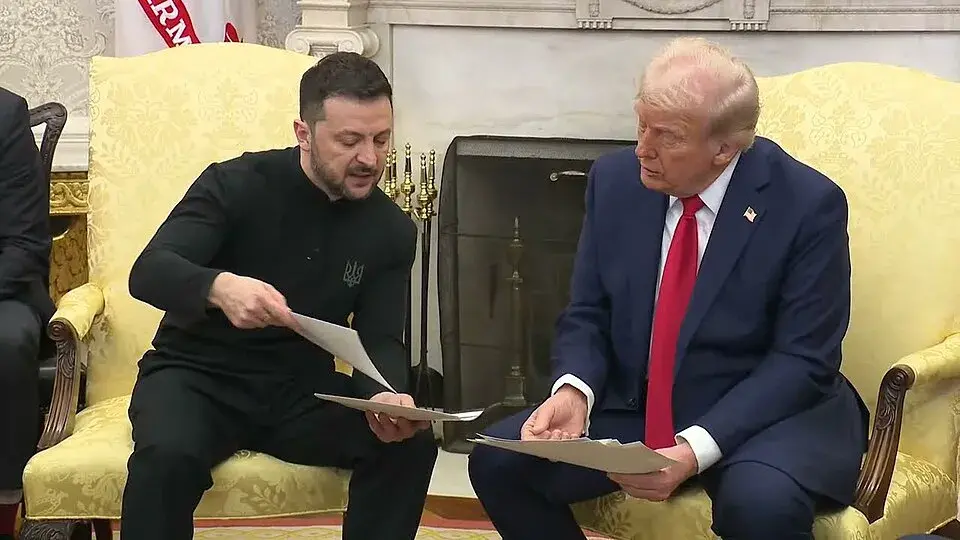Sources close to the negotiations suggest the draft agreement involves territorial concessions and limits on Kyiv’s armed forces, raising concerns among European allies.

KYIV — The Ukrainian government received a draft proposal from the United States on Thursday aimed at ending the armed conflict that began following the Russian invasion in 2022. President Volodymyr Zelensky’s office confirmed it is studying the terms of the plan and announced that the leader will address the issue in a direct conversation with Donald Trump in the coming days.
While Kyiv did not detail the conditions of the agreement, sources familiar with the negotiations anticipate that the U.S. diplomatic proposal includes demands such as the surrender of regions currently occupied by Russia and a reduction in Ukraine’s defensive potential.
These points have generated concern among European Union partners, who consider that such concessions could leave Ukraine vulnerable to a potential resumption of the Russian offensive.
In a statement, the Ukrainian presidency reiterated that any agreement must be based on the “fundamental principles defended by the people of Ukraine,” although it underscored its willingness to work constructively with the United States, the European Union, and other international allies.
“The president looks forward to discussing existing diplomatic options and the key requirements for achieving peace with Donald Trump,” Zelensky’s office noted.
The situation in Ukraine is becoming increasingly difficult. In recent days, Russian troops have consolidated advances in the east of the country while air and missile attacks on urban centers continue. On Wednesday, a bombing of a residential building left at least 26 dead, according to Ukrainian reports, while the partial occupation of Pokrovsk—a strategically relevant railway city—reflects the pressure Kyiv’s army faces on multiple fronts.
Internally, Zelensky’s government has just faced a new corruption scandal that led to the dismissal of two ministers. Parallel to this, a U.S. military delegation led by Army Secretary Dan Driscoll and Chief of Staff Randy George held talks with Ukrainian military chief Oleksandr Syrskyi.
Syrskyi insisted that lasting peace must depend on the defense of airspace, the strengthening of offensive capabilities, and the sustainability of the front against the Russian threat.
Washington’s approach to a diplomatic resolution comes at a moment of tension with Moscow and Europe. The Kremlin stated that there are no formal negotiations regarding the U.S. initiative and reiterated that any progress must address its demands for territorial recognition and security. For its part, the French Foreign Ministry, through Jean-Noel Barrot, maintained that “peace cannot happen through capitulation” and insisted that only a solution based on Ukraine’s sovereignty and security will be acceptable.
Trump, who since his return to the presidency promised to end the war, has shown shifts in U.S. policy. He recently suspended a summit with Vladimir Putin and approved sanctions targeting major Russian oil companies while demanding Kyiv accept conditions that, until recently, would have been unthinkable for its European allies.
The immediate outcome of the negotiations depends as much on Zelensky’s response as on the margin of consensus U.S. diplomacy can achieve with European governments and other relevant actors.
In parallel, the humanitarian situation continues to deteriorate following the destruction of infrastructure and the arrival of winter. The United Nations warns of an increase in displaced persons and the vulnerability of millions of people facing a lack of electricity and basic services due to daily attacks.
The future of the plan will be determined by the dynamics of the upcoming presidential conversations and the ability of the United States to articulate an agreement that satisfies Ukraine’s interests, includes international guarantees, and allows for a political exit that does not imply the abandonment of the population or the disregard of its claims.
Keep Independent Journalism Alive
In a world flooded with noise, independent journalism is more vital than ever. We work hard to bring you clear, accurate, and unbiased international news — free from corporate or political influence.If you believe in the power of honest reporting, please consider making a donation. Every contribution, big or small, helps us stay independent and keep the world informed.
Support us via PayPalYour support makes a difference.


